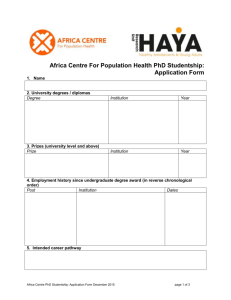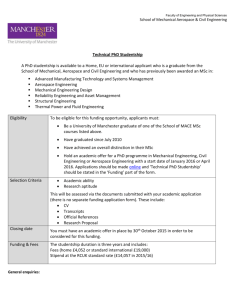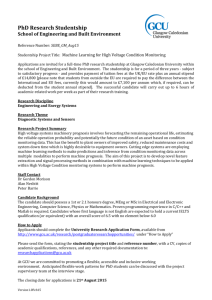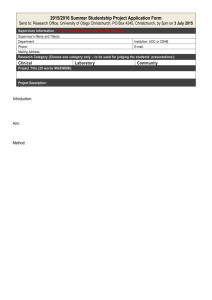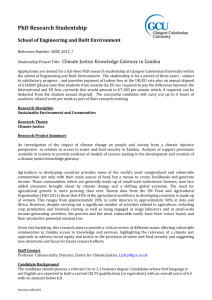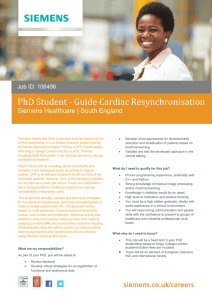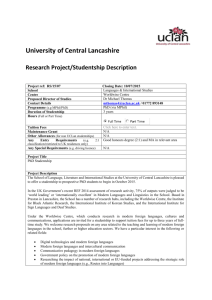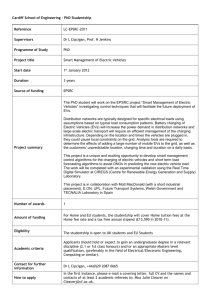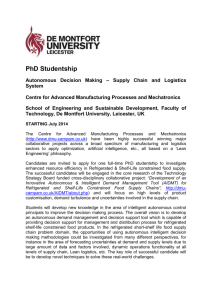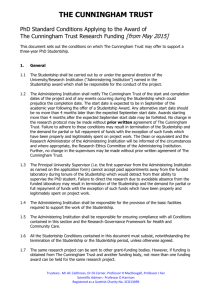THE CUNNINGHAM TRUST PhD Studentship Guidance Notes for
advertisement
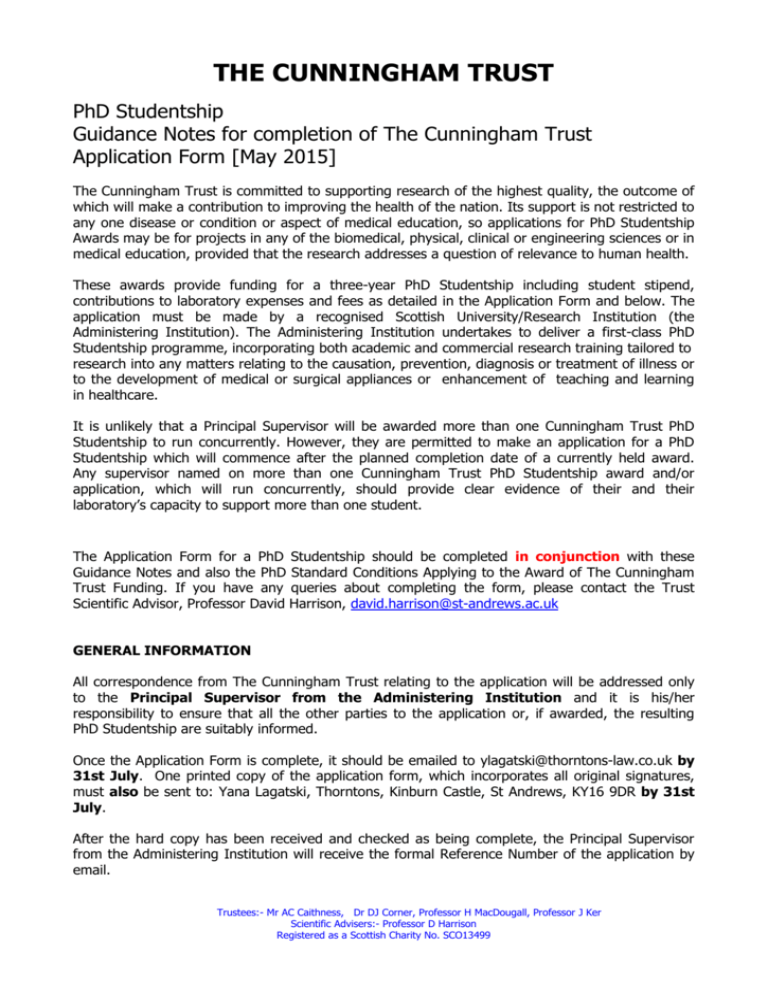
THE CUNNINGHAM TRUST PhD Studentship Guidance Notes for completion of The Cunningham Trust Application Form [May 2015] The Cunningham Trust is committed to supporting research of the highest quality, the outcome of which will make a contribution to improving the health of the nation. Its support is not restricted to any one disease or condition or aspect of medical education, so applications for PhD Studentship Awards may be for projects in any of the biomedical, physical, clinical or engineering sciences or in medical education, provided that the research addresses a question of relevance to human health. These awards provide funding for a three-year PhD Studentship including student stipend, contributions to laboratory expenses and fees as detailed in the Application Form and below. The application must be made by a recognised Scottish University/Research Institution (the Administering Institution). The Administering Institution undertakes to deliver a first-class PhD Studentship programme, incorporating both academic and commercial research training tailored to research into any matters relating to the causation, prevention, diagnosis or treatment of illness or to the development of medical or surgical appliances or enhancement of teaching and learning in healthcare. It is unlikely that a Principal Supervisor will be awarded more than one Cunningham Trust PhD Studentship to run concurrently. However, they are permitted to make an application for a PhD Studentship which will commence after the planned completion date of a currently held award. Any supervisor named on more than one Cunningham Trust PhD Studentship award and/or application, which will run concurrently, should provide clear evidence of their and their laboratory’s capacity to support more than one student. The Application Form for a PhD Studentship should be completed in conjunction with these Guidance Notes and also the PhD Standard Conditions Applying to the Award of The Cunningham Trust Funding. If you have any queries about completing the form, please contact the Trust Scientific Advisor, Professor David Harrison, david.harrison@st-andrews.ac.uk GENERAL INFORMATION All correspondence from The Cunningham Trust relating to the application will be addressed only to the Principal Supervisor from the Administering Institution and it is his/her responsibility to ensure that all the other parties to the application or, if awarded, the resulting PhD Studentship are suitably informed. Once the Application Form is complete, it should be emailed to ylagatski@thorntons-law.co.uk by 31st July. One printed copy of the application form, which incorporates all original signatures, must also be sent to: Yana Lagatski, Thorntons, Kinburn Castle, St Andrews, KY16 9DR by 31st July. After the hard copy has been received and checked as being complete, the Principal Supervisor from the Administering Institution will receive the formal Reference Number of the application by email. Trustees:- Mr AC Caithness, Dr DJ Corner, Professor H MacDougall, Professor J Ker Scientific Advisers:- Professor D Harrison Registered as a Scottish Charity No. SCO13499 PLEASE NOTE: Applications will not be accepted for consideration until a complete hard copy, incorporating all required original signatures and accompanied by all necessary additional documents have been received, in addition to the fully completed electronic copy. All sections of the Application Form must be completed. If a particular section is not applicable to your application, please state so, or select the “Not Applicable” option from the drop-down list. Your application may not be considered if any of the information is missing or if you have failed to include any required documents or signatures. Many of the fields on the Application Form have been character-delimited, so there is a maximum to the amount of information you can provide in each. You will have to be concise. The Application Form is an MS Word form and should, preferably, be completed using MS Word on a PC. It should be downloaded and saved to your hard drive/local network server for completion. Once complete, the file should be saved as a Word file - ideally Word 2003/XP: it should not be saved as a PDF file. Application forms saved as PDF files (or in any format other than MS Word) will not be accepted. Applications larger than 5MB may not be considered. If you choose to incorporate an image or table in the separate Appendix document, please ensure that the size and/or resolution of the inserted graphic has been reduced appropriately to ensure that the combined file size of both parts of the completed application does not exceed the 5MB application size limit. Applications will only be allocated a Reference Number and formally accepted for consideration if they are smaller than the maximum file size, in the correct format AND after receipt of properly completed and signed hard and electronic copies. It is anticipated that applicants will be notified of the outcome of their application in October. Applications will be assessed on the quality and novelty of the science to be conducted; the research questions asked; the potential impact of the project on both the student and Scotland’s medical research base; the experience of the supervisors; the training to be provided; and the resources available. NOTES TO ASSIST IN COMPLETING THE APPLICATION FORM (numbered according to the sections on the Application Form) 1. Administering Institution Details Provide full details, as requested, of the Scottish University/Recognised Research Institution which is applying for the Studentship and in which the student will be matriculated and which will award a PhD degree, subject to successful completion of that institution’s assessment and examination requirements. Trustees:- Mr AC Caithness, Dr DJ Corner, Professor H MacDougall, Professor J Ker Scientific Advisers:- Professor D Harrison Registered as a Scottish Charity No. SCO13499 2. Principal Supervisor from Administering Institution Details Provide full details, as requested, of the Principal (first) Supervisor from the Administering Institution in which the student will be matriculated and of the Department in which the PhD Studentship research will be carried out. Information is requested about the Principal Supervisor’s supervision history. It is assumed that previous PhDs supervised were of 3 years’ duration. If this is not the case please indicate the intended duration in the “Date PhD awarded” column. If there was a valid reason for a student’s PhD taking longer than anticipated, please provide details. 3. Second Supervisor from Administering Institution Details Provide full details, as requested, of the Second Supervisor. 4. Financial Support The Application Form includes a table detailing the financial provision that The Cunningham Trust will make towards the student stipend. The Trust will pay the published home/EU rate for university fees for the first year and reasonable increases annually thereafter. Should fee increases be above 5% per annum, notification of and full justification for the increase must be submitted in writing to The Cunningham Trust. The maximum value of consumables awarded per annum will be £8,000. 5. Research Project Details Sections which are self-explanatory have not been expanded upon in these Guidance Notes. Project Title – this should be no more than 25 words in length and should succinctly inform a reader of the nature of the proposed research. Key Words – Please supply up to 5 keywords for the proposed project. Disease Profile of Project – To ensure that The Cunningham Trust records, classifies and publicises the research it supports appropriately with respect to the diseases which may, ultimately, be alleviated as a result of that research, please select as many of the options from the list as are applicable to your proposed project. Other submissions – If the proposed project has been submitted, or it is going to be submitted, to another funding body, provide details of the: • • • • name of the funding body to which each application has/will be submitted date(s) of each submission date(s) informed of outcome outcome (if known) Lay Summary – This should be of no more than 200 words and should clearly and succinctly describe the aims of the proposed research, how the investigation will be carried out and the results expected. The potential value to human health should also be explained. This summary should be written in plain English so that Trustees with no scientific or medical background can understand the application and decide on the importance of funding the work. Further, it should be noted that The Cunningham Trust may distribute publicity material on work it has supported, so it is to the benefit of the applicants to provide as concise and informative a Lay Summary as possible. Impact Brief explanation of what the impact of the work may be. Trustees:- Mr AC Caithness, Dr DJ Corner, Professor H MacDougall, Professor J Ker Scientific Advisers:- Professor D Harrison Registered as a Scottish Charity No. SCO13499 Start Date – This is expected to be in September of the academic year following the offer of a PhD Studentship Award. Please confirm that this will be the case and, if not, provide an anticipated start date, explaining why the PhD Studentship will not start in September. PLEASE NOTE: any alternative start date should be no more than 4 months later than the expected September start date. Awards starting more than 4 months after the expected September start date may be forfeited. Detailed Project Description – please use the following headings, noting the word limits in several of the sections. The written description may be augmented with one image or one table but only if essential to the application (see Section 10 – APPENDIX below): • Background - should provide sufficient background information to the project, including what is currently known in the area of the proposed research, to enable a reviewer to understand the research questions which intend to be addressed (no more than 300 words). • Aims and Objectives (no more than 250 words). • Experimental Design/rationale and Methods (no more than 650 words). • Outline of the Timetable of Work – please use bullet points or Gantt chart (no more than 150 words). 6. Ethics, Regulatory Issues and Consents An assurance that all necessary ethical and regulatory issues have been addressed at the time of application is vital. If licences and approvals are not in place at this time, The Cunningham Trust must be in assured that all measures are in place to the satisfaction of the Administering Institution within one calendar month of the date of the PhD Studentship Award Letter, which will be conditional on receipt of such assurance. It is recognised that Personal Animal licences required by a student can only be sought/obtained after a student has been selected, but The Cunningham Trust must be in receipt of a copy of such a licence, if required, no later than the due date for the “PhD Studentship Setup Report”, i.e. 3 months after the PhD Studentship start date. Ethical Approval: Ethical approval is required as detailed below for all research involving or related to either patients or staff. This approval also relates to safety precautions. Research Ethics Committee: Where the proposed research involves NHS patients, fetal material or IVF involving NHS patients, the recently dead, access to patients’ records or the use of NHS premises or facilities, the written approval of the appropriate Research Ethics Committee (REC) must be obtained and assurance given with each application that authorisation is in place. Patient or staff information sheets to be used in the research project should be included with the application. PLEASE NOTE: Although an application may be considered by The Cunningham Trust before ethical approval has been granted, any award may only be recommended for funding, subject to assurance that ethical approval has been granted. Animals: Wherever possible, procedures should be used which do not involve live animals. When it is essential to do experiments involving animals, the requirements of the Animals (Scientific Procedures) Act 1986 must be scrupulously observed. There must be proper care, limitation of pain and use of the minimum number of animals to give valid results. Supervisors and students using animals must hold the necessary licences (Project and Personal) from the Home Office. Trustees:- Mr AC Caithness, Dr DJ Corner, Professor H MacDougall, Professor J Ker Scientific Advisers:- Professor D Harrison Registered as a Scottish Charity No. SCO13499 Genetic modification: Research proposals which involve genetic modification of organisms must have written authority from the Health and Safety Executive (HSE), relevant ethic committee and, for the trial of new medicines, authority from the Medicines & Healthcare products Regulatory Agency (MHRA). Stem cells: Research proposals which involve the use of stem cells must have written authority from the UK Human Fertilisation & Embryology Authority. Use of Human Tissue in Research: In all studies where human tissue (irrespective of origin) is used, the Codes of Practice of the Human Tissue Authority (http://www.hta.gov.uk) must be followed. Patient Data: Where patient data are to be used, the guidelines of the Information Services Division Scotland (http://www.isdscotland.org/About-ISD/Confidentiality/) must be followed. Collaboration consent: Research proposals which require additional collaboration MUST be accompanied by a signed hard copy of a letter agreeing to the required collaboration. Outline information about the additional collaboration should be provided at Section 10 on the Application Form, but the Consent Letter(s) should: describe the nature of the required collaboration; provide the names and contact details of any other individuals whose collaboration is required; provide the names and contact details of any other institution, company, enterprise organisation whose collaboration is required; state clearly that consent is given to the proposed necessary additional collaboration. 7. Research and Training Provisions – provide information about the location(s) where the research training will be given, the research environment(s) (including special facilities and available expertise of relevance to the proposed project), the time (%) the student is anticipated to spend at each. The skills and research training to be provided and the methods of student supervision and assessment should be outlined. 8. Previous Cunningham Trust awards – The Trust may seek both to publicise the work carried out by the individuals it supports and also to assess the longer-term impact of its own funding. Please provide outline information of the support received from The Cunningham Trust by any of the supervisors named in this application. 9. Declarations and authorisations – Please ensure that all signatories to this application have read and understood the PhD Standard Conditions of Award of The Cunningham Trust and also the Declarations & Authorisations carefully, before signing the Application Form. The names and positions held of all the individuals MUST be included in the emailed copy as well as the hard copy. 10. APPENDIX (separate document) – You may submit one image or one table, if essential, to support the application. This cannot be inserted into the Application Form, but must be included in the separate Word document (Supporting Image/Table Appendix). Your image or table should be inserted as a .gif, .jpg or .doc file (NOT a .pdf file), and the document saved as MS Word and not PDF or any other format. If you choose to incorporate an image or table in the Appendix, please ensure that the size and/or resolution of the inserted graphic has been reduced appropriately to ensure that the Appendix is no longer than 2 x A4 sides in total and that both parts of the completed application are no greater than the 5MB application size limit. Applications larger than 5MB may not be considered. Trustees:- Mr AC Caithness, Dr DJ Corner, Professor H MacDougall, Professor J Ker Scientific Advisers:- Professor D Harrison Registered as a Scottish Charity No. SCO13499
